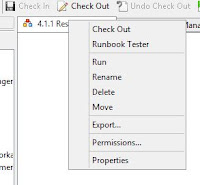When working with orchestrator there are different types of loges that will give you information about your environment.
Runbook Logs - Will give you information about your runbooks, status and behaviour of your runbook creations.
Activity Events - Show Statuses about your Orchestrator infrastructure.
Audit Trail - List information about other services that interact with orchestrator.
Trace logs - Troubleshoot the Orchestrator environment.
Now reading log files can be hard, when you are not using a logging viewer tool. There are many different types of log viewers out there that will help you in your search through the jungle of text.
After working with SCCM and CMTrace for a while, CMtrace is my new friend in the fight against log files.
You can find CMTrace in ConfigMgr 2012 SP1 Toolkit.
Installs to \Start Menu\Programs\Microsoft System Center 2012 SP1\Configuration Manager Toolkit
Is located in C:\Program Files (x86)\Configmgr 2012 Toolkit SP1\ClientTools"
http://www.microsoft.com/en-us/download/details.aspx?id=36213
Runbook Logs:
Real Time log:Runbook generates logs when they are running. The Runbook Designer enables you to view both real-time log information and historic logs.
You can view the real-time log of a runbook on the Log tab in the Log pane of the Runbook Designer. The log has an entry for each running instance of the runbook and the time that it was started. This is real time logs!
If you expand this entry, you can view the activity that is currently running in the Runbook. Double-click the activity to view its details. If you have configured logging for the workbook to include Published Data, this information is included in the activity’s details.
Historic Log
You can view the historic log of a runbook on the Log History tab in the Log pane of the Runbook Designer.

This log has an entry for each completed instance of the runbook with its start and end times and completion status. If you double-click an entry, the Runbook Details dialog box opens that includes each activity in the runbook and its completion status.

This log has an entry for each completed instance of the runbook with its start and end times and completion status. If you double-click an entry, the Runbook Details dialog box opens that includes each activity in the runbook and its completion status.
Now if you need more information about the specific Runbook activities, you can double click on the event and the Runbook details the runbook activities will open up.
Default configuration in Orchestrator is not to include all published information in each activity, this would in a production scenario fill up the orchestrator database with logs. In a Development / test runbook you might need to see what is happening in the different stages of the runbook activities and see what is published in each activity.
So to turn logging on you need to do the following.
1. [Check Out] the Runbook
2. Right click on the runbook and Select [Properties]
3. In the logging pane enable both
"Store Common Published Data"
4. Click Finished when done.
Now the next time you run your runbook you will se that all the activities are showing their published data in the "Details" window.
Runbook Audit History
You can view the "Runbook Audit History" on the Audit History tab of the Runbook Designer. The entries for the currently selected runbook will be displayed. Double-click an entry to open the "Details" dialog box where you can view a list of all activities that were part of the change. Select one of the entries to view the activity that was performed in addition to the old and new values of any properties that were changed.
So when looking at the "Audit History" you can see that we can track information about the changes made to the runbook.
When clicking on the activity we can se more details about the changes that were done.

Often there is more than one administrator making changes in your environment.
Then you as an administrator need more information about the changes that were done in a runbook. You can "enable required promt for comment" in the runbook.
"Enable required promt for comment" ensures that everyone who changes a runbook, have to add a comment when "Checking In" the runbook. The commnent is then added to the comment field in the "Audit History" tab.
Now to enable this click on [Options] in the menu bar and Select [Configure]

In the Configuration window, enable "Prompt for comment on check in" click [OK]
Link: Part 2










No comments:
Post a Comment